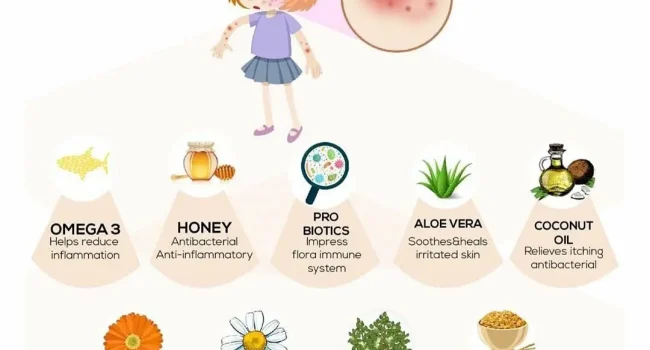Childhood eczema, also known as atopic dermatitis, is a common condition that causes dry, itchy, and inflamed skin. Managing eczema can be challenging, but several natural remedies can help soothe and heal the skin. Here are some effective natural treatments and tips to incorporate into your child’s skincare routine.

1. Moisturizing Regularly
To treat eczema, it is important to keep the skin well hydrated. Natural moisturizers can provide relief and protection.
- Coconut Oil: Coconut oil has anti-inflammatory and antimicrobial properties that can help soothe eczema. Apply a thin layer of virgin coconut oil to affected areas after bathing.
- Shea Butter: Rich in fatty acids and vitamins, shea butter can help nourish and protect the skin. Use raw, unrefined shea butter to moisturize dry patches.
- Olive Oil: Extra virgin olive oil can be used to lock in moisture. Gently massage a small amount into the skin after a bath.
2. Oatmeal Baths
Oatmeal baths are a popular remedy for soothing itchy and inflamed skin.
- How to Prepare: Grind one cup of plain, uncooked oats into a fine powder using a blender or food processor. Add the oat powder to warm bathwater and stir well. Let your child soak for 10-15 minutes. Pat the skin dry gently after the bath and apply a moisturizer.
3. Aloe Vera
Aloe Vera has anti-inflammatory and healing properties that can help manage eczema symptoms.
- Application: Use pure aloe Vera gel, preferably directly from the plant. Apply a skinny layer to the affected location and permit it to dry. Aloe Vera can help reduce itching and promote skin healing.
4. Honey
Honey is a natural antibacterial and anti-inflammatory agent that can be beneficial for eczema.
- Use: Apply a small amount of raw honey to the affected areas. Leave it on for 20 to 30 minutes and then rinse with lukewarm water. Honey can help reduce inflammation and prevent infections.
5. Dietary Adjustments
Diet plays an important role in treating eczema. Some foods can trigger or worsen symptoms, while others can help reduce inflammation.
- Anti-Inflammatory Foods: Include foods rich in omega-3 fatty acids, such as salmon, flaxseeds, and walnuts, in your child’s diet. These can help reduce inflammation.
- Probiotics: Probiotic-rich foods like yogurt, kefir, and fermented vegetables can support gut health, which is linked to skin health.
- Avoid Triggers: Identify and avoid foods that trigger eczema flare-ups. Common triggers include dairy, eggs, soy, and nuts. Keep a food diary to track any potential food sensitivities.

6. Herbal Remedies
Certain herbs can help soothe and heal eczema.
- Chamomile: Chamomile has anti-inflammatory properties that can help reduce itching and redness. Brew chamomile tea, let it cool, and use it as a wash for the affected areas, or add it to bathwater.
- Calendula: Calendula has healing and anti-inflammatory properties. Apply calendula cream or oil to the affected areas to help soothe the skin.
7. Clothing and Laundry Tips
The right clothing and laundry practices can make a big difference in managing eczema.
- Soft Fabrics: Dress your child in soft, breathable fabrics like cotton. Avoid wool and synthetic fabrics that can irritate the skin.
- Laundry Detergent: Use a mild, fragrance-free detergent for your child’s clothes. Avoid fabric softeners and dryer sheets, as they can contain irritants.
8. Hydration
Keeping your child well-hydrated can help maintain skin moisture and overall health.
- Water: Make sure your child drinks plenty of water throughout the day to stay hydrated.
- Humidifier: Using a humidifier in your child’s room can add moisture to the air, preventing dry skin.
9. Stress Management
Stress can trigger or worsen eczema flare-ups. Helping your child manage stress can be beneficial.
- Relaxation Techniques: Teach your child relaxation techniques such as deep breathing, meditation, or gentle yoga.
- Routine: Maintain a consistent daily routine to provide a sense of security and reduce stress.
10. Essential Oils
Some essential oils can help soothe eczema, but they should be used with caution.
- Lavender oil: Lavender oil has mitigating and quieting properties. Dilute a few drops of lavender oil in a carrier oil like coconut or olive oil and apply to the affected areas.
- Tea Tree Oil: Tea tree oil has antibacterial properties and should be diluted in a carrier oil before applying it to the skin. Use sparingly and patch test first to ensure there’s no allergic reaction.
Conclusion
Managing childhood eczema naturally involves a combination of soothing treatments, dietary adjustments, and lifestyle changes. By incorporating these natural remedies into your child’s daily routine, you can help reduce the frequency and severity of eczema flare-ups, providing relief and promoting healthy skin. Always consult with a healthcare provider before starting any new treatments to ensure they are safe and appropriate for your child’s specific needs.
Explore More On Our Website : Homeremedy4u.com